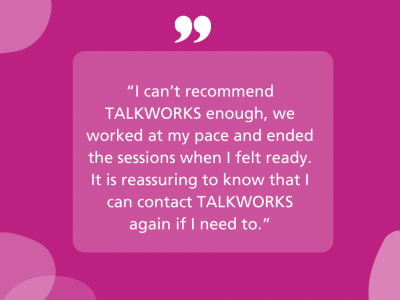- Home
- Anxiety
- Depression
- Emotional Eating
- Living With a Long Term Health Condition
- Loneliness
- Menopause
- Mindfulness
- OCD
- Panic Attacks
- Phobias
- Pregnancy & Parenthood
- Prolonged Grief (Grieving)
- PTSD
- Sleep Difficulties
- Stress
- Needs We Can and Cannot Meet
- Cognitive Behavioural Therapy (CBT)
- Eye Movement Desensitisation & Reprocessing (EMDR)
- Employment Support
- Counselling for Depression
- Online Self-help
- Mindfulness
- Wellbeing Workshops
- Join the team
- Become a volunteer
- What to expect at your first appointment
- Testimonials
- Learn about mental health
- FAQs
- Mental Health Resources
- Blog
- Video Appointments
- Your feedback
- Making contact if you are deaf
- I need help now
Access support from TALKWORKS
Self-refer
How to live well with Diabetes
Diabetes is a lifelong condition that causes a person's blood sugar level to become too high. There are two kinds of diabetes: Type One and Type Two. Being diagnosed with diabetes, or caring for someone who is diabetic, can be really hard for those involved. It’s important to look after yourself and live a healthy lifestyle to ensure blood glucose levels stay balanced.
This year marks 100 years since the treatment that has saved millions of diabetics’ lives around the world – insulin. Society has evolved significantly over the course of the last one hundred years, and as a result of the support that it is in place, people are now learning how to live well with diabetes. Below, Penny from our Exeter team, discusses in more detail the challenges around living with this long term health condition and how she manages them.
What it’s like to live with diabetes
“When you live with diabetes, every day can feel challenging. A succession of pills, blood monitoring, deciding what you can and can’t eat, injections and various doctors’ appointments can all make this condition difficult to live with. The disease evokes many emotions; frustration, isolation, depression, restriction, anger, anxiety, worry, fear, guilt, shame - but for me, never hopelessness.
Having a debilitating disease can bring your mood down at times, but when I was first diagnosed a lovely diabetic nurse told me “Don’t let the disease control you, you must control the disease.” That has stayed with me for over 25 years. Although diabetes has not controlled my life, I did put my head in the sand for a long time and ignored what I was doing to myself. The long term effect of my choices are now having an impact on my life, and my head is definitely no longer buried. My wakeup call was having a serious issue with my eyes and being told I was close to losing my sight. That was the trigger I needed to remind me that this condition is real, and not something that can be ignored. It was hard because I was managing a very unwell husband, and I did not have the time to think about what was being asked of me.
Managing the impact this illness itself has on my mental and physical health has been hard, but I now have a better understanding of my limitations and how this can impact on my wellbeing. People offer advice about various diets, but I choose what’s right for me. I don’t deprive myself the small treats - I have these as a reward. Lots of people have different ideas on how to manage diabetes, but I found knowing and understand who you are and what makes you get up in the morning, helps you to live each day with this disease.”
What help is available?
There are a number of ways you can manage to live well with diabetes, including eating healthily, staying active through exercise, and carrying out regular blood tests. Anyone living with type 1 diabetes will also require regular insulin injections, and medication may be needed for type 2 diabetics as this is a progressive condition.
As well as looking after yourself physically while living with diabetes, it’s important to remember that there is mental health support available too. Our Talking Health team are a team of dedicated team of practitioners, experienced in working with people with a combination of physical and emotional health difficulties. The team primarily use Cognitive Behavioural Therapy (CBT), where we will listen to understand any difficulties you are experiencing and work with you look at treatment options to help you feel better. We also offer a range of wellbeing workshops to help you if you are struggling with sleep, stress or are interested in learning the basics of mindfulness. Improving emotional wellbeing can also help people to improve physical health. If you would like to find out more about TALKWORKS and our services, you can visit the homepage of our website or call us on 03005553344.
Related Posts

Administrative professionals day – thank you to our admin staff
Posted by Victoria Walmesley on 23 April, 2025

Karen gives thanks to TALKWORKS
Posted by Admin on 14 April, 2025

